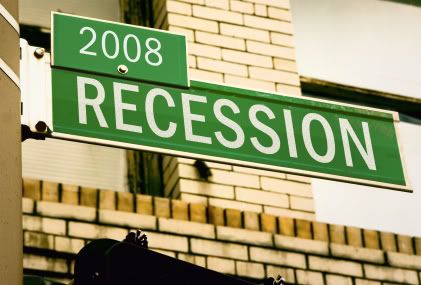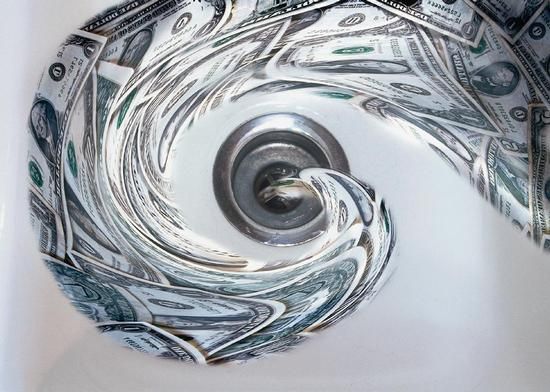
 Our country currently finds itself in the midst of the worst economic crisis since the 1930s and, as during all economic crises, people search for the answer as to why this has happened. Not only have large financial firms been affected, but also mainstays of American industry such as GM and Chrysler, all the way down to the Mom & Pop stores on Main Street. The easy way out is to blame the traditional scapegoats: foreign governments, fraudulent businessmen, and greedy speculators. But the real villain is far more sinister; the organization entrusted with maintaining a stable dollar and touted as the guarantor of economic stability – the Federal Reserve.
Our country currently finds itself in the midst of the worst economic crisis since the 1930s and, as during all economic crises, people search for the answer as to why this has happened. Not only have large financial firms been affected, but also mainstays of American industry such as GM and Chrysler, all the way down to the Mom & Pop stores on Main Street. The easy way out is to blame the traditional scapegoats: foreign governments, fraudulent businessmen, and greedy speculators. But the real villain is far more sinister; the organization entrusted with maintaining a stable dollar and touted as the guarantor of economic stability – the Federal Reserve.In the United States, monetary policy has been the domain of the Federal Reserve since its inception in 1913. Since that time we have had a number of cyclical recessions, each one following a boom caused by the Federal Reserve's loose monetary policy. The problem with the Federal Reserve is that it interferes with market pricing
 functions. Interest rates are a price just like any other and arise because of the fact that people prefer to consume in the present rather than in the future. The extent to which people defer present consumption is reflected in interest rates, which in a free market are determined by the spontaneous interactions and decisions of millions of people.
functions. Interest rates are a price just like any other and arise because of the fact that people prefer to consume in the present rather than in the future. The extent to which people defer present consumption is reflected in interest rates, which in a free market are determined by the spontaneous interactions and decisions of millions of people. Fed intervention to set prices throws markets and interest rates out of equilibrium. When the Federal Reserve pushes interest rates below what the market rate would be, everyone wants to borrow money for long-term projects. Shortages of loanable funds would occur, except that the Federal Reserve has the ability to create bank balances out of thin air. The Fed can create a bank ledger on paper, or on a computer, establish a balance of millions or billions of dollars, and then spend these dollars out into the economy.
Fed intervention to set prices throws markets and interest rates out of equilibrium. When the Federal Reserve pushes interest rates below what the market rate would be, everyone wants to borrow money for long-term projects. Shortages of loanable funds would occur, except that the Federal Reserve has the ability to create bank balances out of thin air. The Fed can create a bank ledger on paper, or on a computer, establish a balance of millions or billions of dollars, and then spend these dollars out into the economy.
Loans become cheap, and the result of these lower interest rates is an economic boom which eventually manifests itself as a bubble. Beginning in 2001, the Federal Reserve pushed interest rates to as low as one percent, which after adjusting for inflation meant that the real interest rate was negative, so businesses were actually making money by taking out loans. This was the fuel for the housing bubble and the reason there are 19 million empty houses today.
 Because of this awesome power to create money out of thin air, the Fed has jumped in to stabilize ailing financial firms by pledging over $7 trillion through various guarantee programs and credit facilities. This is equivalent to over half of the entire nation's GDP. Over $1 trillion of this is already in play, propping up banks and other institutions that should be allowed to fail. All of this has taken place with no oversight by Congress. The Fed was created by Congress, and it is unconscionable that we have allowed it to act in such a way without our oversight. Currently the Federal Reserve's credit facilities, open market operations, and agreements with foreign governments and central banks are all exempt from any sort of audit or oversight.
Because of this awesome power to create money out of thin air, the Fed has jumped in to stabilize ailing financial firms by pledging over $7 trillion through various guarantee programs and credit facilities. This is equivalent to over half of the entire nation's GDP. Over $1 trillion of this is already in play, propping up banks and other institutions that should be allowed to fail. All of this has taken place with no oversight by Congress. The Fed was created by Congress, and it is unconscionable that we have allowed it to act in such a way without our oversight. Currently the Federal Reserve's credit facilities, open market operations, and agreements with foreign governments and central banks are all exempt from any sort of audit or oversight.
Earlier this year I introduced the Federal Reserve Transparency Act, HR 1207, that would remove all restrictions on Federal Reserve audits and call for a full audit of the Federal Reserve System to be completed by the end of 2010. At this writing, 245 of my fellow Congressmen have cosponsored this bill and we hope to have hearings in the near future. In the Senate, Republicans Jim DeMint, Mike Crapo and David Vitter have cosponsored S. 604, companion legislation introduced by Bernie Sanders. I am very encouraged by the tremendous growing momentum on Capitol Hill.
 Our Founding Fathers never intended for a single entity such as the Federal Reserve to have this much power. In fact, there is no authority in the Constitution for the federal government to create a central bank, to enact legal tender laws, or to print paper money. The Tenth Amendment is quite clear that “The powers not delegated to the United States by the Constitution, nor prohibited by it to the States, are reserved to the States respectively, or to the people.” The states themselves are prohibited from emitting bills of credit, i.e. paper money, arising from the Founders' negative experiences with paper money during the Revolutionary War. Cheap, un-backed, easily counterfeited paper money nearly lost the Revolution, until the government returned to mi
Our Founding Fathers never intended for a single entity such as the Federal Reserve to have this much power. In fact, there is no authority in the Constitution for the federal government to create a central bank, to enact legal tender laws, or to print paper money. The Tenth Amendment is quite clear that “The powers not delegated to the United States by the Constitution, nor prohibited by it to the States, are reserved to the States respectively, or to the people.” The states themselves are prohibited from emitting bills of credit, i.e. paper money, arising from the Founders' negative experiences with paper money during the Revolutionary War. Cheap, un-backed, easily counterfeited paper money nearly lost the Revolution, until the government returned to mi An audit of the Fed is only the first step towards returning to where our Founders intended this country to be. The Founders knew that paper money could ruin a country, and drafted the Constitution in such a way that they thought would ensure sound, commodity-backed currency. Unfortunately, the Constitution was dispensed with long ago, and we find ourselves now suffering under an unconstitutional regime of un-backed paper money. Until we abolish the Federal Reserve and return to a stable currency that is not able to be manipulated to create boom and bust cycles, we will continue down the path of economic ruin.
An audit of the Fed is only the first step towards returning to where our Founders intended this country to be. The Founders knew that paper money could ruin a country, and drafted the Constitution in such a way that they thought would ensure sound, commodity-backed currency. Unfortunately, the Constitution was dispensed with long ago, and we find ourselves now suffering under an unconstitutional regime of un-backed paper money. Until we abolish the Federal Reserve and return to a stable currency that is not able to be manipulated to create boom and bust cycles, we will continue down the path of economic ruin. Congress Ron Paul serves the fourteenth district of Texas and is honorary chairman of Campaign for Liberty. His new book, End the Fed (Grand Central Publishing) will release on September 16th and is available for pre-order on Amazon. Click Here To Get Your Copy of 'End The Fed'
Congress Ron Paul serves the fourteenth district of Texas and is honorary chairman of Campaign for Liberty. His new book, End the Fed (Grand Central Publishing) will release on September 16th and is available for pre-order on Amazon. Click Here To Get Your Copy of 'End The Fed'Patriot Acts by Steven Clark Bradley
 Where is Patriot Acts available?
Where is Patriot Acts available? This new exciting novel is easy to find and available all over the net. Here are a few links to help you secure you own copy of Patriot Acts.
Patriot Acts (Print Version) at Amazon,com
Patriot Acts (Print Version) at Cambridge Books
Patriot Acts (Electronic Version) at Ebooks on the net
Patriot Acts (Electronic Version) at Amazon.com
Patriot Acts (Electronic Version) at Fictionwise.com
Patriot Acts (Electronic Version) at Mobipocket.com
it is entertainment or the irrational rambling of a scared
American. I am not afraid; I am convinced that no one
will secure our future except us.
That is why I declare the main theme of Patriot Acts
in one key phrase:
No unconditional Talks – Just patriot Acts!
Author Steven Clark Bradley
From The Mind of Steven Clark Bradley
Steven Clark Bradley @ Inspired Author
Steven Clark Bradley - Nikki Leigh Virtual Book Tours
Steven Clark Bradley @ The Power of The Written Word
Steven Clark Bradley @ Communati.com
Steven Clark Bradley @ Blogtalk Radio.com
Steven Clark Bradley @ Facebook
Steven Clark Bradley @ Twitter.com
Steven Clark Bradley @ Xanga.com
Steven Clark Bradley @ Amazon.com
Steven Clark Bradley @ yuku.com
Steven Clark Bradley @ Bookmarket.com
Steven Clark Bradley @ Published Authors.com
Steven Clark Bradley @ Word That Work
Steven Clark Bradley @ Goodreads.com
Steven Clark Bradley @ Myspace.com
From The Mind of Steven Clark Bradley
Steven Clark Bradley @ Inspired Author
Steven Clark Bradley - Nikki Leigh Virtual Book Tours
Steven Clark Bradley @ The Power of The Written Word
Steven Clark Bradley @ Communati.com
Steven Clark Bradley @ Blogtalk Radio.com
Steven Clark Bradley @ Facebook
Steven Clark Bradley @ Twitter.com
Steven Clark Bradley @ Xanga.com
Steven Clark Bradley @ Amazon.com
Steven Clark Bradley @ yuku.com
Steven Clark Bradley @ Bookmarket.com
Steven Clark Bradley @ Published Authors.com
Steven Clark Bradley @ Word That Work
Steven Clark Bradley @ Goodreads.com
Steven Clark Bradley @ Myspace.com

1 comment:
Binance is one of the best digital assets platforms used by millions of users for exchanging services, sending withdraw fund for personal and business work. But at times, users face common Binance problems like login issues, Sign in matters, password issues, etc. To resolve such questions, you need to dial Binance helpline number and talk to Binance Customer service +1833-228-1682 team. They will listen to your queries carefully and guide you through steps and accessible manner so that you can apply the solutions on your own. https://www.cryptophonesupport.com/exchange/binance/
Post a Comment